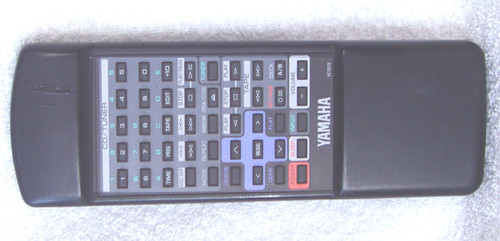Nostalga for sure and limited use these days but for many, the good old AVO multimeter (and its much cheaper "distant" cousin, University) still holds a special place in the memories of many service people!
This University V-O-M (Volt Ohm Meter) or multimeter is one of their basic models, for general purpose electronics and they were commonly used in the 1980's ` 1990's until digital meters became prevalent.
University
Made in Japan
Model: CTN-500MP
Function: measurement of DC voltage, AC voltage, DC current and resistance
Ranges:
Resistance 0 ~ 10M Ohm (4 ranges)
DC Volts 0 ~ 5kV (4 ranges plus sockets to work with 500V and 5kV FSD)
AC Volts 0 ~ 1kV (5 ranges)
DC Current 0 ~ 500mA (4 ranges)
Powered by 2x AA batteries
Supplying the multimeter ONLY (as pictured)
NOT BEING SUPPLIED
2x AA batteries (DUE TO LEAKAGE RISK)
2x Suitable test leads (missing in action but these leads are very easy to find at places such as Jaycar and for very little money)
NO outer carry case
NO instruction manual - long since lost in the anals of time!
COSMETIC CONDITION:
Very clean
No damage to the meter face or body of the multimeter
HISTORY - TESTING:
This multimeter was used way back in my electronics engineering days, it did the job it was supposed to - certainly well below a modern Fluke digital multimeter but these old analog multimeters have a certain "nostalgic" value to them and actually a couple of practical benefits as well.
a) These analog multimeters respond in real time, so when you are looking at AC voltage the pointer will "vibrate" which is unlike a digital multimeter that tends to display ever changing values as it samples the circuit under test.
b) Often more reliable to test semiconductor junctions than a digital meter, e.g diode testing.
c) Old analog meters just look so cool and techie! It's no secret that a number of very high class professional audio equipment have reverted to analog meters on the front panel - that pointer jumping all over the place (e.g VU meters) just beats the hell out of a bunch of numbers or bar graph being displayed every time!
REALITY SETS IN!
In no way would I suggest these are as good as or even better than a digital meter! Digital multimeters will beat an analog multimeter hands down most of the time - I would imagine that someone who wants this University VOM is looking at the nostalgic value only.
These are "good" for relative value testing or approximations and certainly cannot compete with the precise values displayed by a digital multimeter e.g If I measure a 10M Ohm resistor, the meter scale is very compressed at these values so the reading on the meter could be interpreted as anywhere between 8 and 10M Ohm and then there is the issue with parallax errors as well - these are not precise instruments!
With that said, it is still perfectly functional (within the limitations of the design and technology)
First I needed to open it up to place 2x AA batteries inside (2x long screws at the rear - easy to do this).
These batteries are the power source for the resistance measurements (V-I-R) and not required for any other measurements.
I noticed some LIGHT corrosion on the 4x battery terminals, these have been cleaned up and checked. All is fine now.
I also cleaned all of the contacts on the main switch - the tracks are silver plated but over time they oxidise. They are now all nice and clean.
I then checked all of the resistance ranges, working fine and accurate (note the red knob at the bottom of the meter face for the Zero Adjustment function and you may need to adjust this knob as you switch between ranges)
I then checked AC voltage, DC voltage and DC current - all are working fine.
SPECIAL NOTE:
The DC current range has NO protective fuse so you must already have worked out roughly what sort of current you are about to measure otherwise the meter coil is going to struggle with a high current! This meter has a 50uA full scale deflection and if you set the range switch to 50uA but measure a few hundred milliamps, something has to give (and it will likely be the meter coil!)
I would be VERY WARY of using this meter in the 5kV range, although catered for in the AC ranging I doubt the safety at this sort of AC voltage. At the very least, internal arcing is very likely to occur!
In summary, it's a fun test instrument which COULD be pressed into service in limited situations but it's real appeal is the nostalga
Since my testing of this instrument, I have removed the batteries and placed the multimeter in sealed plastic to maintain it's condition and this will be the way it is supplied to the new owner.













